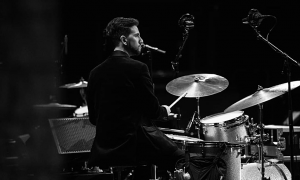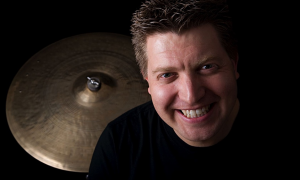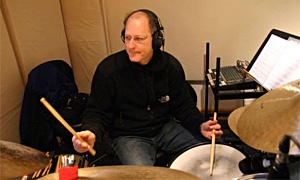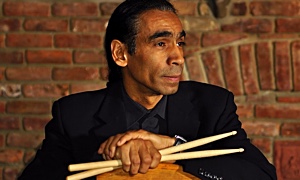Home » Jazz Articles » Rhythm In Every Guise » A Tribute To Max Roach
A Tribute To Max Roach
 I can't recall the reason why I picked Percussion Bitter Sweet out of a record store bin in the mid-sixties. It was one of the first recordings I ever purchased. Apart from Max's brilliant drumming and knotty yet accessible compositions, it served as an introduction to iconic musicians like Eric Dolphy, Booker Little, Clifford Jordan, Mal Waldron, Art Davis, and Abbey Lincoln. Several years later, I experienced Max's mastery of the drums in person. Spanning just a portion of his visionary work, the formats were a solo concert, a hi-hat cymbal tribute to Papa Jo Jones combined with personal reminiscences about Clifford Brown, a duo concert with Cecil Taylor, and Max's last quartet.
I can't recall the reason why I picked Percussion Bitter Sweet out of a record store bin in the mid-sixties. It was one of the first recordings I ever purchased. Apart from Max's brilliant drumming and knotty yet accessible compositions, it served as an introduction to iconic musicians like Eric Dolphy, Booker Little, Clifford Jordan, Mal Waldron, Art Davis, and Abbey Lincoln. Several years later, I experienced Max's mastery of the drums in person. Spanning just a portion of his visionary work, the formats were a solo concert, a hi-hat cymbal tribute to Papa Jo Jones combined with personal reminiscences about Clifford Brown, a duo concert with Cecil Taylor, and Max's last quartet.
When Max Roach died on August 16th, 2007, at the age of 83, I started organizing a tribute as a means of giving thanks to a man who inspired me for over four decades. The Max Roach Tribute Project enabled me to see the range and depth of Max's accomplishments through the eyes of drummers who truly understand the nature of his contributions to the jazz tradition. The generosity of the musicians who took time out of their busy lives to talk and write about Max was genuinely touching. My sincere thanks to everyone who participated.
Max was an icon, not just for American music, but for music in general. He was a pioneer, taking the drum set and percussion to the forefront. Max was one of the few guys who would do solo concerts that were unbelievable, sustaining the majority of people's attention for an hour or two. You were transcended beyond the issue of him just playing drums. M'Boom [the percussion ensemble] allowed drummers to come from the back of the stage to the front of the stage, in their own respective groups, from Joe Chambers to Warren Smith, to a number of other guys.
Max's whole career was really about embracing as opposed to alienating other forms of art. When I first came to New York in the early '80s, Max would have duo concerts with rappers. And guys with beat boxes and Max. Or Max and a guy break dancing. And that was revolutionary for its time because a lot of musicians of his generation were really turning their nose up at this other art form that was being created—hip hop, rap, and all that stuff. Max's thing was about trying to keep the music moving forward.
The other thing that was great about Max was the way he utilized the instrument very much like an orchestra. He was one of the first guys to really take a melodic approach to the instrument, where it wasn't just about rudiments and it wasn't just about playing time.
Max had what I would call a very military style of drumming. As a kid growing up, it reminded me very much of the Drum and Bugle Corps. Very clean. Very crisp. I remember asking Max once—I said, "Max, what do you practice? He looked as if somebody was watching us, and said, "Singles and doubles. And that's all he would say. So I said, "So really, Max, what do you practice? This went on for 10 to 15 minutes. And that's all he would say. Finally he looked at me and grabbed my shoulder. He said, "Carl, everything you play is single or double or multiple bounce. That's it. That took me back to the drawing board of trying to decipher some of the things he would play. The way he would orchestrate and articulate just using simple concepts like dynamics and changes in sticking and accents, and where he would place them, really made a world of difference.
Max was always very helpful to me. When I joined Freddie Hubbard, Max was one of the first people to come down and hear me with Freddie, to congratulate me, and to just sit down and talk to me. One of the things I learned from Max is that you always have to be proud and represent yourself at the highest possible level. Max said that was one of the things Papa Jo Jones taught him. Every time you leave the house you're still a musician. You have to be mindful of how you dress. People are always going to look at you. Max was a gentleman. He would always shake your hand and look you in the eye. These sorts of things for me, a musician just coming to town, were really important.
Max is someone we'll dearly miss, but his imprint is here to stay.
My dad was an avid record collector. His guys were Max, Philly Joe Jones, and Art Blakey. He had the first record I heard of Max Roach, Gene Norman Presents Max Roach and Clifford Brown In Concert. They played "Perisian Throroughfare, "I Can't Get Started, and "Jordu. When I heard the way Max's drums sounded, the way he played, the phrasing, and all that kind of stuff, I just went nuts!
Max was the first guy whose style I could kind of emulate. It was a little bit more approachable then, say, Philly Joe Jones or Art Blakey. Just because of my inability to be able technically to play some of Philly Joe's things, or to play with the same kind of fervor and dynamo style of Art. I could approach Max's way in terms of playing melodically and thematically. I could play a fraction of it. But when I got deeper into it I realized that conceptually, it may have been technically more demanding. Things like Drums Unlimited, some of the solo pieces, and trying to play along with some of those tempos.
The first time I saw Max play, the thing that struck me the most about him was the way he carried himself. Just the way he walked. When he walked on stage to speak, he struck me as very strong, extremely poised, and self-assured. Not in an arrogant, cocky way, but in a strong, confident way. I was moved just looking at him.
Later on in my adult life when I started to play with guys from that era, like Sonny Rollins and J.J Johnson, I realized that they too carried themselves in the same way. This struck me as a very familiar thing. Then I realized that it was the same way my father carried himself. My father was from the same era. And my uncles and some of the men in the neighborhood I grew up in who I knew all my life. A lot of African American men from that particular time, who had gone through the Depression and the post Depression, the war and post war, and all of the other things that went along with society in America. They had done well and had a way about them that was unique.
Max carried that same kind of character when he sat at the drums. He sat up straight. He was very accurate. There was no guessing what he was going to play and what he played. It was very well thought out, and well articulated. There was no, "What was that? It was exactly what it was. You couldn't play it, but you could hear it.
Max was always very nice to me. I got a chance to be around him four or five times. He didn't come to hear me, but he came to Bradley's and I happened to be working there. It was pretty nerve racking to have him sitting right there. I got through the set and did OK. We hung out and talked for quite some time after the gig. I asked him about drums and about Gretsch drums. All of that kind of drum geek stuff. He was real cool and laid everything out for me. Every time I was around him he was a true gentleman, and exactly what I imagined an idol to be like.
In my opinion, Max Roach defined jazz royalty. Just being in his presence made you feel like you had witnessed something that was a rare occurrence, to be studied and reflected upon long after hearing him perform. He definitely influenced my approach to the drum set by showing me that the drummer should be a complete musician in order to really contribute something special to this music we all love dearly.
I began playing the drums at age 15. I didn't really know anything about jazz, but I knew enough to decide that it was the music I most wanted to learn about. Of course I knew about Buddy Rich. A young drummer in the mid-1960s couldn't help but be aware of Buddy. I was playing for a month or two when my teacher, Richie Moore, lent me a record called Rich Versus Roach. Max's melodicism won me over. I knew within minutes the musical direction I would follow. Max was my first major influence and he continues to inspire me to this day. He set such a high standard as a drummer, bandleader, educator, composer, and human being whose social and political consciousness compelled him to speak out, that one can only strive to follow his example. Thank you, Max. Rest in Peace.
Max Roach proved that drums can be a solo instrument able to play themes, variations and melodically cohesive phrases.
I was especially influenced by his solo record Drums Unlimited, showing that the drums could stand on their own as a solo instrument and did not need to always be simply backing up a soloist or keeping time for a band.
Max was a forward thinker and besides playing and recording solo he had various duo projects with the likes of Charles Mingus and Cecil Taylor. He would constantly challenge himself to be more and more creative, and the idea of pushing the envelope was of utmost importance to him.
 Max Roach was a drummer's drummer. He proved that drums can be a solo instrument able to play theme, variations, and rhythmically cohesive phrases. Max was such a melodic player because he really understood harmony; he even studied composition. Max was also a wonderful percussionist, composer, and arranger. He collaborated with choreographers, film makers, and even co-founded Debut Records in 1952 along with Charles Mingus. Roach was a visionary and was always experimenting with different sounds and textures to propel the music to another fresh level. An example would be the groundbreaking free improvisational duo record he made with Mingus called Percussion Discussion, released on Debut Records. We musicians cannot help but to be influenced by all of the records he made with Bird, Diz, and Brownie. Simply classics. I also have to mention a few other records that have really helped me to develop as a drummer. Money Jungle, a 1962 trio recording with Duke and Mingus, Rich Versus Roach, a drum battle between Max and Buddy Rich, and Drums Unlimited, which includes several tracks that are entirely drum solos. And I cannot forget the rhythm he composed and played on Bud Powell's "Un Poco Loco. Layering rhythms on top of rhythms, he paid as much attention to the song's melody as to its beat. He described his approach to music as "the creation of organized sound. A true genius. He will be missed.
Max Roach was a drummer's drummer. He proved that drums can be a solo instrument able to play theme, variations, and rhythmically cohesive phrases. Max was such a melodic player because he really understood harmony; he even studied composition. Max was also a wonderful percussionist, composer, and arranger. He collaborated with choreographers, film makers, and even co-founded Debut Records in 1952 along with Charles Mingus. Roach was a visionary and was always experimenting with different sounds and textures to propel the music to another fresh level. An example would be the groundbreaking free improvisational duo record he made with Mingus called Percussion Discussion, released on Debut Records. We musicians cannot help but to be influenced by all of the records he made with Bird, Diz, and Brownie. Simply classics. I also have to mention a few other records that have really helped me to develop as a drummer. Money Jungle, a 1962 trio recording with Duke and Mingus, Rich Versus Roach, a drum battle between Max and Buddy Rich, and Drums Unlimited, which includes several tracks that are entirely drum solos. And I cannot forget the rhythm he composed and played on Bud Powell's "Un Poco Loco. Layering rhythms on top of rhythms, he paid as much attention to the song's melody as to its beat. He described his approach to music as "the creation of organized sound. A true genius. He will be missed.
Yesterday morning we lost another one. Another innovator and genius of modern music. Max Roach, father of modern jazz drumming, passed away peacefully in his sleep. He was 83 years old. This loss, even more than Dizzy, Miles, Ray, Celia and Olatunji, is especially hard for me. He was my mentor and father figure.
I first met Max in 1977 at the University of Massachusetts where he was a professor, just a year after my father passed. There was no Jazz Studies Department there, but the school was working on starting one at the time. Max was more of an Adjunct Professor, spending many weeks on the road with his Quartet at that time. His group (inter)changed from Reggie Workman and Calvin Hill on bass, Odean Pope and Billy Harper on saxophone, and Cecil Bridgewater on trumpet. Max took a strong interest in me and fostered a great relationship as I followed him around everywhere I could. At that time I played drums as well as congas and was very interested in becoming a mini-Max. I even started to dress like him, wearing a dapper trench coat, slick shoes, and hat. Eventually my friend (brother) drummer Chuck McPherson and I started to roadie for his Percussion Ensemble, M'Boom Re: Percussion. There are so many stories there! Especially with Joe Chambers and Roy Brooks. We spent days and nights at Max's home, which was located in Greenwich, Connecticut. (We never ventured very far from the basement where all the drum equipment was located.) What a treat that was for two 19 year old aspiring drummers.
My connection with him also extended to his family, with his son Raoul who I taught conga to while we were both students at UMASS.
What does all this mean? Well it means that I have a connection, as do all of the drummers/musicians and percussionists of the modern era, with a man that gave music and the instrument majesty. His concerts were like going to see Royalty. His presentation was flawless in every aspect. His demeanor was that of a Samurai or a skilled physician ready to perform surgery. Max never gave me a lot of technical things to study, but gave me exercises in listening. He made me take my life and my music just that more seriously. I will miss him dearly! He was beloved by all that are endeared to the creative spirit in music. I'll miss you Max. You son in drums, Kevin Jones.
 I can sum it up in one sentence. Max Roach turned solo drumming into an art form. To me that says it all. When I was just a kid my father and me listened to Clifford Brown & Max Roach. That's a classic. There are solos on there that I've transcribed, and more solos that I need to transcribe. On a recording he did with M'Boom, the percussion ensemble, he was doing these solos which made me think about space, how to use melody, and how to use short phrases on memorable rhythms. That record opened my mind up and made me change my whole approach to drum solos. It has influenced my drumming to this day. A lot of people complement me on my drum solos. I owe that to Max Roach.
I can sum it up in one sentence. Max Roach turned solo drumming into an art form. To me that says it all. When I was just a kid my father and me listened to Clifford Brown & Max Roach. That's a classic. There are solos on there that I've transcribed, and more solos that I need to transcribe. On a recording he did with M'Boom, the percussion ensemble, he was doing these solos which made me think about space, how to use melody, and how to use short phrases on memorable rhythms. That record opened my mind up and made me change my whole approach to drum solos. It has influenced my drumming to this day. A lot of people complement me on my drum solos. I owe that to Max Roach.
Max was on the first jazz record I ever bought, which was a Miles and Bird record
The first thing that struck me about Max was his soloing! I'm sure everyone will say that. Max was a great musical speaker who gave out a tremendous amount of jazz drum vocabulary to draw from. For example, when you listen to his solo on "Delilah with Clifford Brown, he starts out the solo with quarter note triplets with mallets, and shows us how to properly construct a masterpiece. He goes from quarter note triplets, into sixteenth notes, into sixteenth note triplets, back to sixteenth notes, then sixteenth note triplets again, and into eighth note triplets. The eighth note triplet section features classic Max playing the triplets between the floor tom-tom, snare drum and small tom, using some accents to great effect along the way. The transitions are smooth as silk, and he plays some beautiful over the bar line stuff using sixteenth notes at the end.
Max's time playing was classic, of course. He played four on the floor with the bass drum a lot, but was also one of the first drummers to begin breaking away from the classic four on the floor and begin more of a dialogue between his bass drum and snare drum, while playing the ride cymbal. His cymbal beat was played a little more on the even eighth side versus the triplet side, and he showed us how to comp creatively without upsetting the flow of the music.
Max's playing will go on to influence many drummers and musicians. He was one in a million!
Thank you for the opportunity to pay tribute to Max Roach. I was so saddened to hear of his passing
What else is there to say? Max was one of the best and a true innovator in so many ways.
When I was the "new kid in town I started to see all of the big time players. There were guys like Buddy and Gene who played these really quick rhythms. Max was the first one I saw who took those techniques and developed them into something more. He had a way of playing with such a musical feel to everything that he did.
His playing will continue to move and inspire musicians and music lovers forever.
Max Roach is an influence on all of us who play drums in modern jazz today. His leadership, creativity and musical daring, clarity of expression and overall musicality set a high standard that we all aspire to. His willingness to speak out on social issues is also something I always admired about him. In 1979, while a student at Arizona State University, I received a National Endowment for the Arts grant to study with Max Roach. For me, this was a turning point in my life as an aspiring musician. As a young college student from Phoenix, Arizona, I found the opportunity quite overwhelming, but I looked forward to it anxiously. During the times we met, Max always encouraged me to "think outside the box, to continue to develop my musical skills, and to work toward being a bandleader, creating an outlet for my own musical ideas and visions. "Don't be content being a sideman waiting for the phone to ring, he used to say. Whenever I heard Max live I was always inspired by his abilities on the instrument, but also by his presence onstage behind the drum set. He always seemed in control...directing, orchestrating and leading from the drums. Max Roach, a mentor, teacher, inspiration, innovator and giant...thank you so much for everything!
The other night I did a tribute to Max, playing "The Drum Also Waltzes. When I finished, the jazz director of the club said it was like a song. That was the genius of Max Roach. He was someone who could make the drums—a non-specific pitched instrument—capable of delivering a song. It's easy to see why people refer to him as a melodic drummer. To me, he was a compositional drummer, and the strong melodic sense was part of that.
Max wasn't into any tricks. When you think about it, many of the drummers who preceded Max had a show aspect to their playing. Sometimes the musical result was directly tied to a visual trick or something that would dazzle the audience. This wasn't the case with Max. He did dazzle us; that's for sure. But it was his musicianship that dazzled.
Max had a profound influence on my drumming because he would play with a beautiful feel, swinging time, incredible invention, but he also played with intelligence. I think that the intelligence is directly related to the compositional sense. The intelligence never overshadows the joy and the exuberance that comes with swinging. His playing is profound, but it also feels great. Sometimes musicians say that things are too cerebral when we feel that something is too analytical and not heartfelt. There was a cerebral quality to Max's playing, because he was an intelligent person. But his playing is so full of passion and intensity.
Max made great art. He wasn't just a swinging drummer. He was an innovator. We all know what his accomplishments were, like playing with Duke and Bird when he was 17 years old. But when you think about the "Freedom Now Suite, or his accompaniment to Martin Luther King's "I Have A Dream speech, that's another thing. The drums have always been associated with a call to do something. The drums are used in war; they're used in celebration. Max used the drums to call for social change. He was incredibly profound.
I knew that Max was sick for quite some time. To be honest, every time I heard his music on WKCR, I suspected the worst. When you hear these musicians being featured on a radio station, it's usually because they're passed. I was always relieved when it wasn't the case. Nevertheless, I knew that the day would come. And I always thought about how I would react. I had in my mind that I would play a huge tribute to Max. I got the chance to do a little of that on August 24th, the day of his services. So I can be thankful for that.
Max had a profound effect on me. I didn't name my son after myself. I named my son after Max.
Though I never met Max, I was touched by his playing and his music. He seemed to be about musical development and expression, and never about flash or commercialism. He made perhaps the biggest leap forward of any of the giants in terms of making the drum set a legitimate solo instrument, expressing not only rhythm, but melody and even harmony, as he was one of the great innovators at soloing on song structure. He really developed his own language on the drum set, parts of which became commonplace in the drummers who came after him, even to this day. He was THE most important drumming influence on many greats such as Tony Williams and Ed Blackwell.
As I listened to WKCR's Max Roach Memorial broadcast, I was reminded, above all else, of Max's creative ideas and the amazing clarity with which they were expressed.
Phil Stewart
What can one say about the great Max Roach? He was one of the fathers of modern music. His work with Sonny Rollins and Bud Powell provided the blueprint I used to learn the art of jazz drumming. When I met him he was very kind and was gracious enough to sign my copy of Money Jungle. Thanks Max.
If you listen to Max Roach's solo on the song, "The Scene Is Clean, from the record Clifford Brown and Max Roach At Basin Street, particularly the four measure phrase at 4:03, you can hear the past, present and most of all future jazz drumming. Just in those four measures.
 In the '40s, '50s, and '60s, there were major innovators who were taking the drums in new directions that were unimaginable. Max was definitely one of those people. Not only from a vocabulary of drumming, or ground breaking drum solos, like "For Big Sid, "Drums Unlimited, or "The Drum Also Waltzes, but also for all of the great music he played with people like Clifford Brown, such as "I Get A Kick Out Of You. All of those major up tempo things really set a new standard.
In the '40s, '50s, and '60s, there were major innovators who were taking the drums in new directions that were unimaginable. Max was definitely one of those people. Not only from a vocabulary of drumming, or ground breaking drum solos, like "For Big Sid, "Drums Unlimited, or "The Drum Also Waltzes, but also for all of the great music he played with people like Clifford Brown, such as "I Get A Kick Out Of You. All of those major up tempo things really set a new standard.
I also have a personal favorite CD of Max's that doesn't seem to be that well known. Definitely check out the recording, Members Don't Git Weary. There are six songs on it and all of them are killin'. Every tune sounds so urgent and alive. The players are Charles Tolliver, Gary Bartz, Stanley Cowell, and Jymie Merritt. Andy Bey also sings a song. It was recorded when the civil rights movement was in full bloom. So, you've got these young lions, for lack of a better term, playing music that is so inspirational, so forward thinking and so positive. And then there's Max right there, kickin'! The music's also not necessarily in the bebop tradition, or in the style people usually think of when they think of Max. The first song almost sounds like a second-line kind of funk groove. There's another tune in an odd meter, with a regular bridge, which Max solos over. But, it's not like the structured four-stroke ruff kind of thing. It's more of a wall of sound—so different and daring.
I also remember Max as a great gentleman. The way he sat up straight when he played the drums. He was so proud. What he represented was a feeling of, "We're not just a bunch of guys just playing tunes. We're artists. We're proud to be musicians. I always thought that was so beautiful and it's made an impression on me that's lasted my whole life.
Also, the whole dogmatic attitude of, "Jazz is only this. Max didn't think like that. Max was always looking ahead. He knew that jazz was in constant motion. One thing I like to say to all my students is "It's great to pay homage to the past, just don't get stuck in it. To me, Max shouldn't be remembered only as a great technical drummer or a bebop drummer...He was so much more than that. His compositions and odd meter explorations, plus his duos with Cecil Taylor, he was always on the cutting edge of where jazz should be going. And not only musically, but socially and politically as well. Those things aren't separable. Music always reflects the times and he knew that.
Max gave an incredible gift to all of us. In life, there are certain individuals who pass on the torch to new generations. After that, whatever they take from it is up to them. Leaving a legacy is what it's all about. Max did that in spades. He really led an incredible life.
< Previous
Classical Katz
Comments
Tags
For the Love of Jazz
 All About Jazz has been a pillar of jazz since 1995, championing it as an art form and, more importantly, supporting the musicians who create it. Our enduring commitment has made "AAJ" one of the most culturally important websites of its kind, read by hundreds of thousands of fans, musicians and industry figures every month.
All About Jazz has been a pillar of jazz since 1995, championing it as an art form and, more importantly, supporting the musicians who create it. Our enduring commitment has made "AAJ" one of the most culturally important websites of its kind, read by hundreds of thousands of fans, musicians and industry figures every month.























